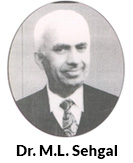Our Approach
Our approach is different from other homoeopaths who practice ‘Classical Homoeopathy’. They take all the symptoms of the body from head to toe, making the selection of medicine a complicated process. But in our approach the process is very simple and highly accurate. A patient while talking about his disease gives us clues for the selection of the medicine through his body language, gestures, facial expressions, behaviour, version etc. His relation with the people in his contact, his business, his fears, his daily routine, his likes dislikes etc. govern his mental state. In case of a disease, our mind is the first to react. That is why we treat patients on the basis of mind symptoms only.

This system of mind symptoms has been propagated by Late Dr. M.L. Sehgal who has given us a wonderful way of prescription. According to this system it is considered that whenever a patient comes to a doctor he tells us about his psyche and mental set up at that time along with his problem. The most important point worked out here is to get to the core of his psyche like WHAT he says, HOW he says and WHY he says. His nature, behaviour, gestures, body language, face expression and other common and usual features are noted. These features go a long way in determining the medicine to be administered to the patient.
The process of conversion of the version of a patient into the codified language called rubric has been explained below with the help of a few examples:
1.”Dr. Sahib, give me some medicine which gives instant relief. Generally homoeopathy works very slowly that is why I don’t go for it.”
‘Carried desire to be fast’.
2. “Dr. Sahib, few days back someone told me about you but I did not bother. Today I was just crossing, when I decided to come to you.”
‘Frivolous’ and ‘Unconsciousness interrupted by screaming’.
3. “Dr. Sahib I have been suffering for the last so many days (months) but did not bother. But now I can’t bear it more.”
Previously ‘Indifference to suffering’ and now ‘Fear of extravagance’.
4. “Dr. Sahib, please do something, please save me.” Or the patient at home is crying for the doctor, “Save me please, call the doctor.”
‘Delirium, crying for help’.
5. “Dr. Sahib I don’t interfere in my children’s affair I don’t say them anything, whether they make it 5 or 50, make it or mar it, whether they gain or lose, it is theirs. I have reconciled with the time and circumstances.”
‘Recognises reality and accepts it’.
Now let us take another example to clarify the different mental set up of the patient. A patient when asked,” Can you go for any tests or investigations for the diagnosis of your ailment?” may give any of the following answers depending on his mental state at that point of time.
I am text block. Click edit button to change this text. Lorem ipsum dolor sit amet, consectetur adipiscing elit. Ut elit tellus, luctus nec ullamcorper mattis, pulvinar dapibus leo.
“No, no, there is no need of tests. I do not want to go in for any of the tests as I am afraid of the tests. There may be some serious problem. You just treat me as such.”
“The tests have already been done and I think there is no need of going in for any of the tests. But if you say they are urgent then let’s go for them.”
“I do not want to go in for tests as I am short of money nowadays.”
This shows that different people give different replies on being asked the same question depending upon their psyche at that particular instant of time. So their medicine changes according to their reply.